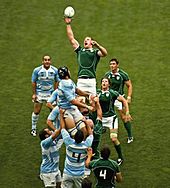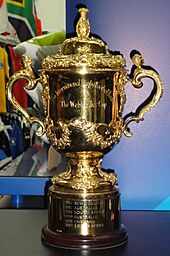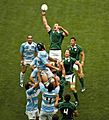Rugby World Cup facts for kids
 |
|
| Sport | Rugby union |
|---|---|
| Instituted | 1987 |
| Number of teams | 24 |
| Regions | International (World Rugby) |
| Holders | South Africa (2023) |
| Most titles | South Africa (4 titles) |
The Men's Rugby World Cup is a huge international rugby union tournament. It happens every four years. The winning team is known as the world champion in rugby.
World Rugby is the main group that runs the tournament. The winners get a special prize called the Webb Ellis Cup. This cup is named after William Webb Ellis. A popular story says he invented rugby by picking up the ball and running with it during a football game.
The first tournament was held in 1987. New Zealand and Australia hosted it together. Four countries have won the cup: South Africa has won it four times, New Zealand three times, Australia twice, and England once. South Africa is the current champion. They beat New Zealand in the final of the 2023 tournament.
From 1987 to 1995, sixteen teams played in the tournament. In 1999, it grew to twenty teams. Japan hosted the 2019 Rugby World Cup, and France hosted the 2023 Rugby World Cup. The tournament will get even bigger in 2027 in Australia, with twenty-four teams.
The women's rugby world cup was officially renamed "Rugby World Cup" in 2021 to be equal with the men's event. However, after the 2023 Rugby World Cup, World Rugby decided that all past and future tournaments would include "Men's" or "Women's" in their names. So, the 2025 Women's Rugby World Cup will be the first to use "Women's," and the 2027 Men's Rugby World Cup will be the first to use "Men's."
Contents
How the Tournament Works
Getting into the World Cup
To play in the Rugby World Cup, teams must qualify. Twenty teams make it into each World Cup. Twelve teams automatically qualify. These are the top three teams from each of the four groups in the previous World Cup. They are called "seeded teams."
The other eight spots are decided by regional games. Teams from Europe, Oceania, the Americas, Africa, and Asia compete for these spots. The very last spot is decided by a special play-off game between teams from different continents.
Playing the Tournament
The tournament lasts about six weeks, usually in September and October. Twenty nations compete. It has two main parts: a group stage and a knockout stage.
Teams are divided into four groups, from A to D. Each group has five teams. The teams are ranked based on their World Rugby Rankings. The top-ranked teams are spread out into different groups. Then, other teams are added to fill the groups.
Each team plays four games against the other teams in its group. A special bonus points system is used in these games. If teams have the same number of points, there are rules to decide which team ranks higher.
Eight teams move on to the knockout stage. These are the winner and runner-up from each of the four groups. The knockout stage includes quarter-finals, semi-finals, and then the final. The winner of one group plays against the runner-up of a different group in the quarter-finals. Winners of the quarter-finals go to the semi-finals. The winners of the semi-finals play in the final. The teams that lose in the semi-finals play a game for third place, called the 'Bronze Final'. If a knockout game ends in a tie, they play extra time. If it's still a tie, the next team to score any points wins.
History of the Rugby World Cup
Early Days of Rugby Tournaments
Before the Rugby World Cup, there wasn't one big global rugby competition. But there were other important tournaments. One of the oldest is the Six Nations Championship. It started in 1883 with England, Ireland, Scotland, and Wales. France joined later, and then Italy in 2000, making it the Six Nations.
Rugby union was also played at the Summer Olympic Games a few times, starting in 1900. But it stopped being an Olympic sport after 1924.
The idea for a Rugby World Cup was suggested many times since the 1950s. But most rugby groups were against it. In the early 1980s, Australia and New Zealand separately suggested creating a World Cup. In 1985, the idea was finally approved by the main rugby board.
The first World Cup was held in May and June 1987. Australia and New Zealand hosted it together. Sixteen nations played. There were no qualifying games for this first tournament. Instead, seven main rugby nations and nine invited teams played. New Zealand won the first World Cup, beating France 29–9 in the final.
The next tournament in 1991 was hosted by England, with games also in Britain, Ireland, and France. For this World Cup, qualifying games were introduced. Eight spots were given to the top teams from 1987, and the other eight were decided by qualifying games involving thirty-five nations. Australia won this tournament, beating England 12–6 in the final.
In 1992, South Africa played New Zealand in a special match. This was after the end of apartheid, a system of unfair separation in South Africa. With their return to international rugby, South Africa was chosen to host the 1995 Rugby World Cup. South Africa surprised everyone by winning the opening game and continued to the final, where they played New Zealand. South Africa won a very close game 15–12 in extra time. Their president, Nelson Mandela, wearing a South African rugby jersey, gave the trophy to their captain, Francois Pienaar.
Rugby Becomes Professional
The 1999 tournament was hosted by Wales. Games were also played in other parts of the UK, Ireland, and France. The number of teams grew from sixteen to twenty, and it has stayed at twenty teams since then. Australia won their second title, beating France in the final.
After 1995, rugby became a professional sport. This, along with more teams, led to some very one-sided games in 1999 and 2003. Some teams scored over 100 points. Australia's 142–0 win over Namibia in 2003 is the biggest score difference in World Cup history.
The 2003 event was hosted by Australia. England won, beating Australia in extra time. This was a big moment because it was the first time a team from the northern hemisphere won the cup. Many people in London celebrated England's victory.
France hosted the 2007 competition. South Africa won their second title, beating England 15–6. A big surprise was Argentina, who beat strong European teams like France, Ireland, and Scotland. They finished third overall, which helped rugby become more professional in Argentina.
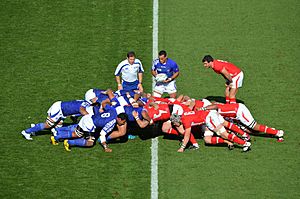
New Zealand hosted the 2011 tournament. The All Blacks (New Zealand's team) won the final 8–7 against France.
The 2015 tournament was hosted by England. Japan caused a huge upset by beating South Africa, even though Japan hadn't won a World Cup game since 1991. New Zealand won the final again, this time against Australia. They became the first team to win three titles and the first to win two World Cups in a row.
Japan hosted the 2019 World Cup. This was the first time the tournament was held outside the usual rugby countries. Japan won all their group games and reached the quarter-finals for the first time. South Africa won their third trophy, matching New Zealand's record. South Africa beat England 32–12 in the final.
France hosted the 2023 World Cup. South Africa won again, beating New Zealand 12–11. They became the second nation to win two World Champion titles in a row and the first nation to win the tournament four times.
The Webb Ellis Cup
The winners of the Rugby World Cup receive the Webb Ellis Cup. It's also just called the Rugby World Cup trophy. This trophy was chosen in 1987 for the competition. It was made in 1906 by Garrard's Crown Jewellers.
The trophy is repaired and cleaned after each tournament. The words 'The International Rugby Football Board' and 'The Webb Ellis Cup' are carved on the front. The names of all the winning teams since 1987 are engraved on the base of the trophy. It is 38 centimeters tall and is silver covered in gold. It has two handles, one with a satyr's head and the other with a nymph's head. In Australia, people sometimes call the trophy "Bill," which is short for William Webb Ellis.
In 2015, a special 24-carat gold-plated rugby ball was made to celebrate the World Cup Final. It looked just like the official match ball used in the final game between New Zealand and Australia.
Choosing the Host Country
Rugby World Cup Ltd (RWCL), which is owned by World Rugby, organizes the tournaments. The host country is chosen by a secret vote of World Rugby Council members. The host nation is usually picked five or six years before the tournament.
Sometimes, more than one country hosts the tournament. For example, Australia and New Zealand co-hosted in 1987. World Rugby requires that the host country must have a stadium that can hold at least 60,000 people for the final game. Host nations sometimes build new stadiums or improve old ones for the World Cup. The Millennium Stadium was built for the 1999 tournament, and Eden Park was improved for 2011.
Japan hosted the 2019 Rugby World Cup, which was the first time a country outside the traditional rugby nations hosted the event. France hosted the 2023 Rugby World Cup. The United States will host the 2031 tournament, which will be another first for a non-traditional rugby nation.
Tournament Growth
Media Coverage
The Rugby World Cup is often said to be the third-largest sporting event in the world, after the FIFA World Cup and the Olympics. However, some people question if this is completely accurate.
World Rugby has often talked about how much the tournament's TV audience has grown. They reported audiences of 300 million for the first tournament in 1987, and up to 4 billion in 2007. However, the 4 billion figure was questioned because the total global TV audience is only about 4.2 billion.
Independent reviews have pointed out that these growth numbers might not be entirely correct. They also noted that most of the audience for the 2007 final came from a few strong rugby countries like Australia, South Africa, the British Isles, and France. It's not just rugby; other sports have also been accused of making their TV reach seem bigger than it is.
Even if the global popularity is debated, there's no doubt that interest is very high in countries where rugby is popular. The 2003 final between Australia and England was the most-watched rugby union match ever on Australian television. The 2023 tournament had 1.33 billion viewing hours, making it the most-watched rugby event of all time.
Attendance at Games
The number of people who attend the games has changed over the years.
| Year | Host(s) | Total attendance | Matches | Avg attendance | Stadium capacity | Attendance as % of capacity |
|
|---|---|---|---|---|---|---|---|
| 1987 | 604,500 | 32 | 20,156 | 1,006,350 | 60% | ||
| 1991 | 1,007,760 | 32 | 31,493 | 1,212,800 | 79% | ||
| 1995 | 1,100,000 | 32 | 34,375 | 1,423,850 | 77% | ||
| 1999 | 1,750,000 | 41 | 42,683 | 2,104,500 | 83% | ||
| 2003 | 1,837,547 | 48 | 38,282 | 2,208,529 | 83% | ||
| 2007 | 2,263,223 | 48 | 47,150 | 2,470,660 | 92% | ||
| 2011 | 1,477,294 | 48 | 30,777 | –35% | 1,732,000 | 85% | |
| 2015 | 2,477,805 | 48 | 51,621 | 2,600,741 | 95% | ||
| 2019 | 1,698,528 | 45* | 37,745 | 1,811,866 | 90% | ||
| 2023 | 2,437,208 | 48 | 50,775 | 2,586,173 | 94% | ||
| *Typhoon Hagibis caused 3 group stage matches to be cancelled. As a result, only 45 of the scheduled 48 matches were played in the 2019 Rugby World Cup. | |||||||
| Key | |
|---|---|
| Record high | |
| Record low | |
Tournament Results
Past Tournaments
- Keys
- aet: result/match won after extra time
| Ed. | Year | Host | First place game | Third place game | Num. teams |
||||
|---|---|---|---|---|---|---|---|---|---|
| Champion | Score | Runner-up | Third | Score | Fourth | ||||
| 1 | 1987 | New Zealand |
29–9 | France |
Wales |
22–21 | Australia |
16 | |
| 2 | 1991 | Australia |
12–6 | England |
New Zealand |
13–6 | Scotland |
16 | |
| 3 | 1995 | South Africa |
15–12 (a.e.t.) | New Zealand |
France |
19–9 | England |
16 | |
| 4 | 1999 | Australia |
35–12 | France |
South Africa |
22–18 | New Zealand |
20 | |
| 5 | 2003 | England |
20–17 (a.e.t.) | Australia |
New Zealand |
40–13 | France |
20 | |
| 6 | 2007 | South Africa |
15–6 | England |
Argentina |
34–10 | France |
20 | |
| 7 | 2011 | New Zealand |
8–7 | France |
Australia |
21–18 | Wales |
20 | |
| 8 | 2015 | New Zealand |
34–17 | Australia |
South Africa |
24–13 | Argentina |
20 | |
| 9 | 2019 | South Africa |
32–12 | England |
New Zealand |
40–17 | Wales |
20 | |
| 10 | 2023 | South Africa |
12–11 | New Zealand |
England |
26–23 | Argentina |
20 | |
| 11 | 2027 | To be determined | To be determined | 24 | |||||
| 12 | 2031 | To be determined | To be determined | 24 | |||||
How Nations Have Performed
Twenty-five nations have played in the Rugby World Cup. Only New Zealand (1987 and 2011) and South Africa (1995) have hosted and won the tournament. Other host nations like England (1991) and Australia (2003) finished second. France (2007) finished fourth. Wales (1999) and Japan (2019) reached the quarter-finals.
Wales was the first host nation to be knocked out in the group stage in 1991. England was the first solo host nation to be knocked out in the group stage in 2015. Out of the twenty-five nations that have played, ten of them have played in every tournament.
Team Records
| Team | Champions | Runners-up | Third | Fourth | Quarter-finals | Apps in top 8 |
|---|---|---|---|---|---|---|
| 4 (1995, 2007, 2019, 2023) | N/A | 2 (1999, 2015) | N/A | 2 (2003, 2011) | 8 | |
| 3 (1987, 2011, 2015) | 2 (1995, 2023) | 3 (1991, 2003, 2019) | 1 (1999) | 1 (2007) | 10 | |
| 2 (1991, 1999) | 2 (2003, 2015) | 1 (2011) | 1 (1987) | 3 (1995, 2007, 2019) | 9 | |
| 1 (2003) | 3 (1991, 2007, 2019) | 1 (2023) | 1 (1995) | 3 (1987, 1999, 2011) | 9 | |
| N/A | 3 (1987, 1999, 2011) | 1 (1995) | 2 (2003, 2007) | 4 (1991, 2015, 2019, 2023) | 10 | |
| N/A | N/A | 1 (1987) | 2 (2011, 2019) | 4 (1999, 2003, 2015, 2023) | 7 | |
| N/A | N/A | 1 (2007) | 2 (2015, 2023) | 2 (1999, 2011) | 5 | |
| N/A | N/A | N/A | 1 (1991) | 6 (1987, 1995, 1999, 2003, 2007, 2015) | 7 | |
| N/A | N/A | N/A | N/A | 8 (1987, 1991, 1995, 2003, 2011, 2015, 2019, 2023) | 8 | |
| N/A | N/A | N/A | N/A | 3 (1987, 2007, 2023) | 3 | |
| N/A | N/A | N/A | N/A | 2 (1991, 1995) | 2 | |
| N/A | N/A | N/A | N/A | 1 (1991) | 1 | |
| N/A | N/A | N/A | N/A | 1 (2019) | 1 |
Qualification Results for Nations
As of the 2027 World Cup, 27 nations have qualified to compete in the tournaments.
| Team | 1987 |
1991 |
1995 |
1999 |
2003 |
2007 |
2011 |
2015 |
2019 |
2023 |
2027 |
2031 |
Years |
|---|---|---|---|---|---|---|---|---|---|---|---|---|---|
| Q | Q | Q | Q | Q | Q | Q | Q | Q | Q | Q | TBD | 11 | |
| Q | Q | Q | Q | Q | Q | Q | Q | Q | Q | Q | TBD | 11 | |
| Q | Q | Q | Q | Q | Q | Q | Q | Q | - | TBD | TBD | 9 | |
| - | - | - | - | - | - | - | - | - | Q | TBD | TBD | 1 | |
| Q | Q | Q | Q | Q | Q | Q | Q | Q | Q | Q | TBD | 11 | |
| Q | Q | - | Q | Q | Q | Q | Q | Q | Q | Q | TBD | 10 | |
| Q | Q | Q | Q | Q | Q | Q | Q | Q | Q | Q | TBD | 11 | |
| N/A | N/A | - | - | Q | Q | Q | Q | Q | Q | Q | TBD | 7 | |
| - | - | - | - | - | - | - | - | - | - | Q | TBD | 1 | |
| Q | Q | Q | Q | Q | Q | Q | Q | Q | Q | Q | TBD | 11 | |
| Q | Q | Q | Q | Q | Q | Q | Q | Q | Q | Q | TBD | 11 | |
| - | - | Q | - | - | - | - | - | - | - | - | TBD | 1 | |
| Q | Q | Q | Q | Q | Q | Q | Q | Q | Q | Q | TBD | 11 | |
| - | - | - | Q | Q | Q | Q | Q | Q | Q | TBD | TBD | 7 | |
| Q | Q | Q | Q | Q | Q | Q | Q | Q | Q | Q | TBD | 11 | |
| - | - | - | - | - | Q | - | - | - | Q | Q | TBD | 3 | |
| Q | Q | Q | Q | Q | Q | Q | Q | E | Q | Q | TBD | 10 | |
| ' | - | - | - | X | - | Q | - | Q | B | - | TBD | 2 | |
| - | Q | Q | Q | Q | Q | Q | Q | Q | Q | TBD | TBD | 9 | |
| Q | Q | Q | Q | Q | Q | Q | Q | Q | Q | Q | TBD | 11 | |
| B | B | Q | Q | Q | Q | Q | Q | Q | Q | Q | TBD | 9 | |
| - | - | - | Q | - | - | - | - | X | E | Q | TBD | 2 | |
| Q | - | Q | Q | Q | Q | Q | Q | Q | Q | TBD | TBD | 9 | |
| Q | Q | - | Q | Q | Q | Q | Q | Q | - | TBD | Q | 9 | |
| - | - | - | Q | Q | - | - | Q | Q | Q | TBD | TBD | 5 | |
| Q | Q | Q | Q | Q | Q | Q | Q | Q | Q | Q | TBD | 11 | |
| Q | Q | - | - | - | - | - | - | - | - | Q | TBD | 3 | |
| Total | 16 | 16 | 16 | 20 | 20 | 20 | 20 | 20 | 20 | 20 | 24 | 24 |
- Legend
- = Hosts
- Q = Qualified (or just for the 1987 World Cup, invited)
- - = Did not qualify (or not invited to the 1987 World Cup)
- X = Expelled during qualification
- E = Expelled after qualification
- B = Banned
Records and Fun Facts
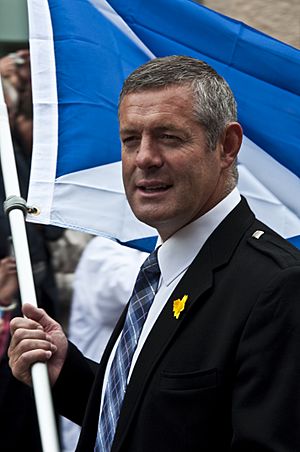
The player with the most points in all World Cups is England's Jonny Wilkinson, who scored 277 points. New Zealand's Grant Fox holds the record for most points in one tournament, with 126 in 1987. Sam Whitelock from New Zealand has played in the most World Cup matches: 26 between 2011 and 2023.
New Zealand's Simon Culhane holds the record for most points in a single match by one player (45 points). He also holds the record for most conversions in a match (20). New Zealand's Marc Ellis scored the most tries in a single match, with six against Japan in 1995.
Jonah Lomu from New Zealand was the youngest player to appear in a final. He was 20 years and 43 days old in the 1995 final. Lomu (who played in two tournaments) and South Africa's Bryan Habana (who played in three tournaments) share the record for most tries in total World Cup tournaments, both with 15. Lomu (in 1999), Habana (in 2007), and New Zealand's Julian Savea (in 2015) and Will Jordan (in 2023) also share the record for most tries in one tournament, with 8 each.
South Africa's Jannie de Beer kicked five drop-goals against England in 1999. This is a record for one player in a single World Cup match. The record for most penalties in a match is 8. This record is held by Australia's Matt Burke, Argentina's Gonzalo Quesada, Scotland's Gavin Hastings, and France's Thierry Lacroix. Quesada also holds the record for most penalties in one tournament, with 31.
The most points scored in a single game is 145, by New Zealand against Japan in 1995. The biggest winning difference in a game is 142 points. This was when Australia beat Namibia in 2003.
A total of 25 players have been sent off (given a red card) in the tournament. Welsh player Huw Richards was the first, playing against New Zealand in 1987. No player has received more than one red card.
Images for kids
-
A scrum between Samoa (in blue) and Wales (in red) during the 2011 World Cup
-
Gavin Hastings of Scotland is one of four players to have kicked a record eight penalties in a single World Cup match.
See also
 In Spanish: Copa del Mundo de Rugby para niños
In Spanish: Copa del Mundo de Rugby para niños


